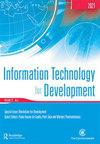Does information and communication technology really affect human development? An empirical analysis
IF 6.4
3区 管理学
Q1 DEVELOPMENT STUDIES
引用次数: 1
Abstract
ABSTRACT Positive effect of information and communication technology (ICT) on human development (HD) is not guaranteed simply by the availability of technology; this gap is especially pronounced for developing countries. Using the Capability Approach framework, we collected data from 115 countries for 2019. We tested a sample to determine stable groups of countries and split the dataset into two groups, which homogeneity differs significantly. Finally, we estimated the hypotheses predicting the influence of ICT on HD for both groups using a path modelling technique. Our results confirm the significant positive contribution of ICT on all kinds of conversion factors (CFs), except social ones in developing countries. However, the way to transform capabilities into functionings differs. In developing countries, ICT contributes to HD at the individual level only. For developed countries, ICT contributes more to social CFs and less to personal ones.信息和通信技术真的影响人类发展吗?实证分析
摘要信息和通信技术对人类发展的积极影响并不能仅仅通过技术的可用性来保证;这种差距在发展中国家尤为明显。利用能力方法框架,我们收集了115个国家2019年的数据。我们测试了一个样本,以确定稳定的国家组,并将数据集分为两组,同质性差异显著。最后,我们使用路径建模技术估计了预测ICT对两组HD影响的假设。我们的研究结果证实,除发展中国家的社会因素外,信息和通信技术对各种转换因素都有显著的积极贡献。然而,将功能转换为功能的方式有所不同。在发展中国家,信息和通信技术仅在个人层面上为HD做出贡献。对于发达国家来说,信息和通信技术对社会CF的贡献更多,对个人CF的贡献更少。
本文章由计算机程序翻译,如有差异,请以英文原文为准。
求助全文
约1分钟内获得全文
求助全文
来源期刊

Information Technology for Development
Multiple-
CiteScore
11.30
自引率
16.70%
发文量
34
期刊介绍:
Information Technology for Development , with an established record for publishing quality research and influencing practice, is the first journal to have explicitly addressed global information technology issues and opportunities. It publishes social and technical research on the effects of Information Technology (IT) on economic, social and human development. The objective of the Journal is to provide a forum for policy-makers, practitioners, and academics to discuss strategies and best practices, tools and techniques for ascertaining the effects of IT infrastructures in government, civil societies and the private sector, and theories and frameworks that explain the effects of IT on development. The concept of development relates to social, economic and human outcomes from the implementation of Information and Communication Technology (ICT) tools, technologies, and infrastructures. In addition to being a valuable publication in the field of information systems, Information Technology for Development is also cited in fields such as public administration, economics, and international development and business, and has a particularly large readership in international agencies connected to the Commonwealth Secretariat, United Nations, and World Bank.
 求助内容:
求助内容: 应助结果提醒方式:
应助结果提醒方式:


